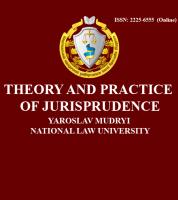Проблеми публічних закупівель крізь призму європейського досвіду
Problems of public procurement in comparison with european experience
Author(s): Andrii OlefirSubject(s): Law, Constitution, Jurisprudence, Law on Economics, EU-Legislation
Published by: Національний юридичний університет імені Ярослава Мудрого
Keywords: public procurement; tenders; public order; corruption; customers; Directive 2014/24/EU; electronic auction; innovation; small and medium businesses;
Summary/Abstract: In this article were investigated actual problems of public procurement system of Ukraine. According to this we prepared several proposals how to improve national legislation, particular, they concern procedure of electronic auction, qualification of suppliers, ensuring the selection of the most economically advantageous tender, preventing the corruption. Also we analyzed experience of the EU in the legal resolution of these problems and trends how to stimulate the development of national economy by using public procurement. In Ukraine the most widespread point of view is that the main objective of legal policy in the field of public procurement – active anticorruption measures. However, this goal should be the development of competition, which will provide the most cost-effective acceptance of proposals. Thus, public procurement around the world is one of the most important regulators of the economy, which activates development of national production.The new legislation on public procurement, which introduced electronic auctions does not solve most of the problems that arise in the process of public tendering, including: all suppliers admit to auction and this approach distorts competition; subjects of procurement can be divided for tendering concealment; electronic trades do not provide procurement at the lowest price; trades can be canceled on contrived grounds, because winners belong to the «right» party; inadequate preparation for tenders of customers and participants (discrepancy of product specifications etc.); high risks of personal data disclosure; unjustifiably broad application evaluation criteria of price proposals; customers often abuse the freedom of suppliers qualification.Among the hazards in public procurement besides corruption can be mentioned lobbying (legal advocacy of suppliers by representatives of the customer) and reducing the usefulness of public goods (products purchase only on the basis of prices). For example, in Kenya a large number of state contracts are concluded with enterprises controlled by influential politicians or public officials. Tenders are often controlled by informal cartels, that is why new entrants can not win. This indicates that Ukraine needs to significantly expand the range of «related persons» in national legislation, which participation in tenders have prohibited.Ukraine's legislation on public procurement does not solve problems, not only to stimulate economic development, but does not ensure elimination of corruption factors and competition protection.Given this, we should pay attention to the provisions of Directive 2014/24/EU establishing more effective approaches to the legal regulation of public procurement, than Ukrainian laws. In order to eliminate these drawbacks it is advisable to adopt experience of legal regulation of public procurement in the EU, namely: the evaluation of bids pass after their qualifying examination; if state (municipal) enterprise satisfy procurement needs, public tenders will not be announced; the tendency to unite demand from customers (occasional joint centralized procurement) to achieve economies of scale; customers have considerable discretion in regulating the terms of tender procedures; the most economically advantageous offer should be based on not only the price but the best value for money (non-price criteria directly include costs for product life cycle, quality, technical advantages, aesthetic and functional characteristics, accessibility for all users, social, environmental and innovative characteristics; qualifications and experience of staff, who execute the contract, if it affects the level of performance of the contract; maintenance in service and technical assistance, delivery terms; costs during operation); - democratic rules of technical specifications preparation; innovation recognized the purpose of public procurement; legislation include special measures which stimulate enterprises to implement environmental and other standards, encouraging the participation of small and medium enterprises in tenders and businesses of disabled and other socially disadvantaged groups.In our opinion, it would be appropriate to adopt the list of products (with the division into categories), for which exist a permanent market. For the acquisition of them customers are entitled (or required) to use a mixed system of evaluation. Also it would be better to expand the range of «connected persons», who can not participate in tenders.
Journal: Теорія і практика правознавства
- Issue Year: 1/2017
- Issue No: 11
- Page Range: 1-16
- Page Count: 16
- Language: English, Russian, Ukrainian

